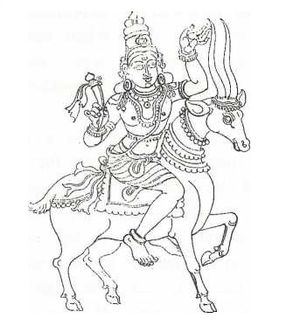Vayu
By Swami Harshananda
Vayu means air.
Vayu is also a Vedic deity, and name of the presiding deity of air. Vayu is represented as a minor God-army called Maruts, who form seven sets of seven each. There are forty nine Maruts in all. They are the younger brothers of Indra.
Vayu represents strength and tamo guna, and is a close associate of Vedic Rudra. He is also a devotee of Vishnu.
The great characters Hanuman of Ramayana and Bhimasena of Mahabharata are said to be born by Vayu's grace, and are referred to as the sons of Vayu.
Vayu in the context of life-breath is referred to as prana. There are five pranas that conduct the human system - prana, apana, vyana, udana and samana.
Significance of Vāyu[edit]
Vāyu or air is one of the pañcabhutas or five basic elements of the world. Vāyu is also the presiding deity over it and is said to be dikpālaka[1] ruling in the direction of north-west. Hanumān and Bhīma were born due to his grace. Vāyu as vital air acts inside the body as five major prāṇas and five subsidiary prāṇas.[2]
Iconographic Representation of Vāyu[edit]
Iconographical works describe him as white or ash-grey in complexion. He has two hands carrying a bow and an arrow. He rides on a deer. Some works describe him as having four arms holding a banner[3] with two and a water-pot in the third, the last hand showing varadamudrā.[4] Sometimes the four hands are shown as holding:
Vāyu’s palace is called Gandhavatī.
References[edit]
- The Concise Encyclopedia of Hinduism, Swami Harshananda, Ram Krishna Math, Bangalore

